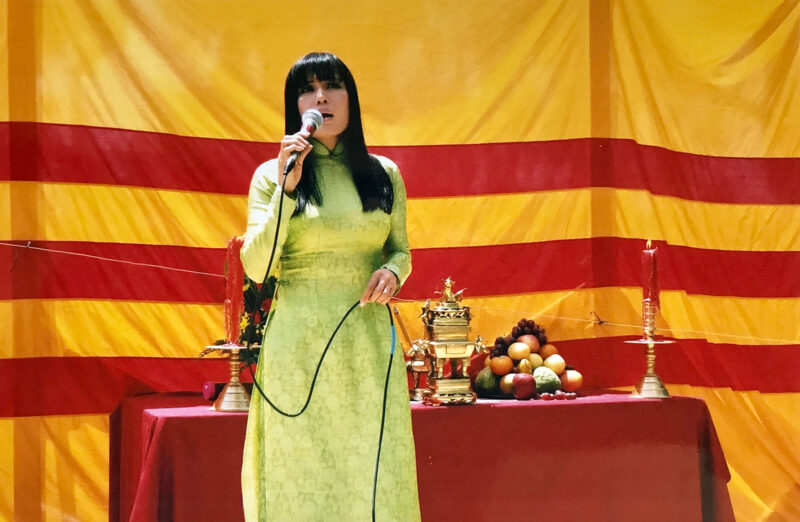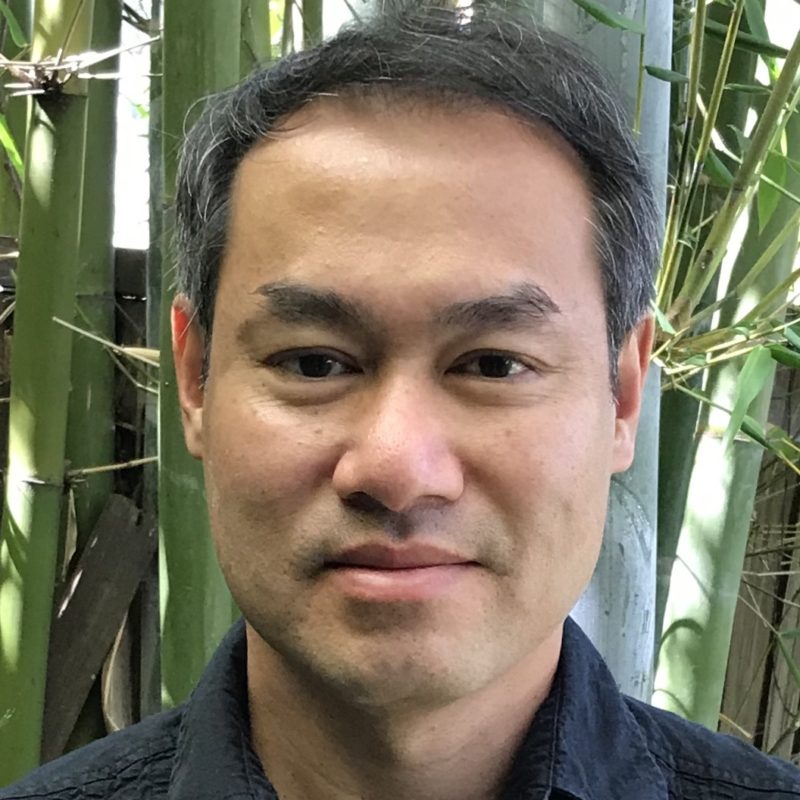
Song of the Sea
On stage she sings, The Sea Remembers
She sings to the fathers, Cognac in hand,
cursing the bastards (There are many, on all sides)
who’d taken down the country.
She sings to the mothers who’d surrendered
dead babies to the ocean.
She sings to the solitary men
who’d left behind family,
pounding Budweisers in the back.
Tomorrow you leave
The sea remembers you
crying after your trailing soul
The mountains lean your way
calling home your name
The shorelines keep watch
listening for your footsteps…
Her voice carries Trịnh Công
Sơn’s melancholy through the air
like the faintly visible things:
the drift of stage fog
clouds of Pall Mall smoke
scattered, unsettled dust.
As she extends a sorrowful note
towards the heavenly vaults,
the recollections surge through your head
in waves, the hair on your arms sway
like kelp in a rising current
reaching towards some unknown light.
Before the song ends, you feel the upswell
of the boat rocking…cresting…soaring
on the currents of reminiscence
as the breakers carry you along
to the very last word.
Song Song Song
Sài Gòn(e) spent, no longer
Viết Nắm write, keep
Hàng me in a tamarind grove
Mỹ lọt the Americans drop
Gẫy sập break and fall
Run Rẩy trembling
Theo Ðạn chasing bullets
Con mến the poor children
Tìm Chết search after death
Ðổ tổ the shattered country
Dấy loạn rebels
Thân thể the body
Lung lay totters, faltering
Trốn bay flees into hiding
Ra-đi-ổ leaves home
Hít sông inhaling the river
Huế đen of black Huế
Mây sáng the morning mist
Ðam mê of dreams
Bút Việt the Vietnamese pens
Một(e) nốt(e): one ballad:
Lòng sóng turbulent soul
Rest in Peace
Tormented by remorse,
A sense of dereliction of duty
(The worse kind of guilt)
Haunts the survivors every night
Memories flail through the seabed
Pulau Bidong claims
Reaching towards a distant shore
Where loved ones remain
The longing to return a constant wish
They haven’t had the means to fulfill
Until now
A jade bracelet, a silver cross, clams in the fist
~~~~~
The tides rise in the chest
As they approach the Jetty
Nothing welcomes them
But that of memory
After two decades
They enter the ocean
The waves encircle their bodies
And release all the emotions
They tread to the deserted seashore,
Listening to the waters they cup
Like recovered taels
In the palm of each hand
~~~~~
They clear the overgrown forest
They clean and reface the tombstones
Of the child, the grandmother, the ill-fated
Buried beneath an unknown land
They light joss sticks
And say the liberation prayers
They sing the salvation songs
So the spirits may finally rest in peace
Through the clearing, the rays of sunlight
Return the eternal gratitude
To the delegation whose sympathy
Will be forever remembered
Christmas Bombing
1972. The year I was born, your world went dark.
The bombs they dropped killed your father.
The agents they sprayed made your mother sick.
They took your eyes, before you came into existence.
They disfigured your limbs, before you could crawl.
Now, the Americans return to ask for forgiveness.
You’re happy to say hello and return a smile.
I can’t fathom, little brother, how easily you grin
and waddle, like a seal, to support your family–
a duty, you say, you were born to own.
You look up with empty sockets where eyes should have been,
and take their offering with flippers where arms should have been.
Without eyes, I wonder, ashamed of myself,
Do your tears fall on the inside?
For $20 you’re glad to say the words they hunger for:
Hello, You help, You friend, Thank you.
With simple words you release the demons
that have haunted them all these years.
They bow and tear up, and pledge allegiance to a common humanity.
Big brother, I understand their sorrow, you say.
I’ve heard their stories: the anguish that torments them
for having killed women and children,
the guilt they feel for torching our villages,
the madness that haunts them behind closed doors.
The GIs bow, clasp their hands and say, thank you. Thank you.
A-O.K., you reply. We friends. We peace.
I’m conflicted. The anger and sadness burn in me, little brother.
But I too, am sorry, and have come to ask for forgiveness.
(I’m sorry for being a Việt Kiều, for having been lucky enough
to lose a country.)
You simply say the words I need but can’t bear to hear:
My life has always been this way, big brother, so please don’t cry.
Author Bio
 John Vượng Quốc Vũ was born in Sài Gòn. Vu’s writing has been anthologized in various publications, including the Perfume River Poetry Review, edited by Vuong Quoc Vu, the Asian American Writer’s Workshop’s Topography of War, edited by Andrea Louie, and James Adams’s Against Agamemnon War Poetry. Vu’s photographs have been exhibited in various venues in San Francisco and Oakland. He lives with his wife and two children in Oakland, California. https://wartimeandmemory.home.blog/
John Vượng Quốc Vũ was born in Sài Gòn. Vu’s writing has been anthologized in various publications, including the Perfume River Poetry Review, edited by Vuong Quoc Vu, the Asian American Writer’s Workshop’s Topography of War, edited by Andrea Louie, and James Adams’s Against Agamemnon War Poetry. Vu’s photographs have been exhibited in various venues in San Francisco and Oakland. He lives with his wife and two children in Oakland, California. https://wartimeandmemory.home.blog/
Do you enjoy reading diaCRITICS? Then please consider subscribing, donating, following us on Instagram or Twitter, and sharing this post to your social networks. You can also join the conversation by leaving a comment!


